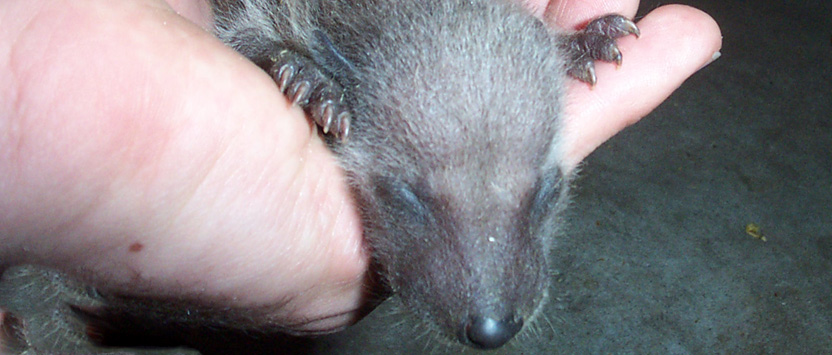NEED LOCAL HELP? We have
wildlife removal professionals servicing 95% of the USA. Click
here to hire a
local raccoon removal expert in your home town. Updated
2018. But read the below advice first!
No, I really don’t recommend feeding a baby raccoon. I won’t
even talk about the obvious risk of contracting a disease or
parasite that’s carried by raccoons, I will just say that by
feeding a baby raccoon you’re simply not doing it any good.

Here are some scenarios:
You’ve found a single baby raccoon stranded somewhere, and you
took it home. If you feed it and raise it, then release it
somewhere where you think it could live happily ever after in
its “natural habitat”, the animal will probably be unequipped to
deal with this novel environment, and will die shortly.
You’ve permanently removed a raccoon from your property just to
later discover that you’ve orphaned a couple of helpless baby
raccoons. You begin taking care of them and feeding them. Again,
when they’re old enough, you take them “back into the wild”.
You’re just releasing them to catch their untimely death,
nothing more; there’s very little chance that they’ll be able to
cope in an environment that they’re completely unfamiliar with.
You’ve found a litter of baby raccoons, and you’re somehow sure
that the mother is absent. The animal lover in you urges you to
tend to them and feed them. The ending of this story is the same
one as for the previous two, but now there’s also a big chance
that you’ve just stolen the babies and left a desperate raccoon
mother aimlessly searching for its young.
You’ll probably think that once released, chances that the
raccoon will die are not as high as I’m suggesting. Okay. Then
just take into consideration the fact that there are so few wild
places in the US that can support more raccoons than they
already do, that the chances of you coincidentally choosing one
that can are close to none. Unnatural high population of
raccoons in wild environments will also lead to insufficient
food which will either determine them to go on life-threatening
journeys back to the cities, or to just die of starvation. If
you provide food in wild places where there’s a high
concentration of raccoons, this will lead to disease outbreaks
that will kill not only the raccoon population in an unpleasant
manner, but will also affect other fauna in the area.
‘Okay. Then I won’t release the raccoon. I’ll just feed it,
raise it, and keep it as a pet.’ The raccoon is not a domestic
animal. Just don’t. Please, don’t.
‘Okay. I’ll just keep it in a cage, then.’ That’s just cruel and
unusual punishment. It just breaks my heart to think of this
beautiful and intelligent animal living the rest of its natural
life in a cage. Please, don’t.
Solution? Find a wildlife rehabilitator near you, and give them
the baby raccoon. A wildlife rehabber will properly raise the
baby, inoculate it against diseases, get it accustomed with its
future habitat, and either find it a permanent safe place in a
wildlife center or release it where they know it’s safe for the
raccoon, as well as for the other surrounding fauna and flora.
You can find a good wildlife rehabilitation directory here.
Go back to the Raccoons in the attic
home page.
Read more articles about raccoons:
About Raccoons
How Do I Know If
There Are Baby Raccoons In the Attic?
How to Keep
Raccoons Out of My Bird Feeder
How to Catch a
Raccoon with a Snare Pole
What Is a Raccoon’s Mating Habits?
What Is a Raccoon’s Natural Diet?